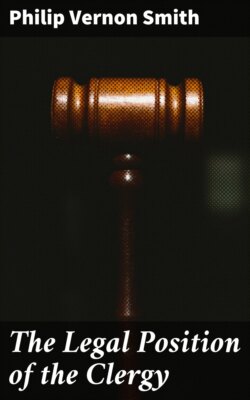Читать книгу The Legal Position of the Clergy - Philip Vernon Smith - Страница 30
На сайте Литреса книга снята с продажи.
Оглавление6. The bishop admits a presentee by formal institution in the case of a rectory or vicarage (the presentee kneeling before him), and by licence in the case of a perpetual curacy. In the case of admission to the benefices of new ecclesiastical parishes, which though by law perpetual curacies, are titular vicarages,[60] the practice varies. Admission by licence is the correct course; but by the desire of the presentee himself institution is sometimes granted. Where the bishop is himself the patron, he cannot present, and therefore admits by collation, which corresponds to the two processes of presentation and institution.[61] Before institution, collation, or admission by licence, the clerk makes two declarations and takes two oaths.[62]
(i.) A declaration of assent, namely—
I assent to the Thirty-nine Articles of Religion, and to the Book of Common Prayer, and of the ordering of Bishops, Priests, and Deacons. I believe the Doctrine of the Church of England as therein set forth, to be agreeable to the Word of God; and in Public Prayer and Administration of the Sacraments I will use the Form in the said Book prescribed and none other, except so far as shall be ordered by lawful authority.[63]
(ii.) A declaration against simony, namely—
I, A. B., hereby solemnly and sincerely declare in reference to the presentation made of me to the rectory or vicarage, &c.) of—— as follows:
1. I have not received the presentation of the said rectory (or vicarage, &c.) in consideration of any sum of money, reward, gift, profit, or benefit directly or indirectly given or promised by me, or by any person to my knowledge or with my consent, to any person whatsoever; and I will not at any time hereafter perform or satisfy any payment, contract, or promise made in respect of that presentation by any person without my knowledge or consent.
2. I have not entered, nor, to the best of my knowledge and belief, has any person entered, into any bond, covenant, or other assurance or engagement, otherwise than as allowed by sections one and two of the Clergy Resignation Bonds Act, 1828,[64] that I should at any time resign the said rectory (or vicarage, &c.).
3. I have not by myself, nor, to my knowledge, has any person on my behalf, for any sum of money, reward, gift, profit, or advantage, or for or by means of any promise, agreement, grant, bond, covenant, or other assurance of or for any sum of money, reward, gift, profit, or benefit whatsoever, directly or indirectly procured the now existing avoidance of the said rectory (or vicarage, &c.)
4. I have not, with respect to the said presentation, been party or privy to any agreement which is invalid under section one, subsection three, of the Benefices Act, 1898.[65]
(iii.) The oath of allegiance, namely—
I, A. B., do swear that I will be faithful and bear true allegiance to His Majesty King Edward the Seventh, His Heirs and Successors according to Law. So help me God.
(iv.) The oath of canonical obedience, namely—
I, A. B., do swear that I will perform true and canonical obedience to the Bishop of C. and his successors in all things lawful and honest. So help me God.[66]
Moreover, on the first Lord's Day on which he officiates in church in his benefice, or such other Lord's Day as the ordinary allows, he is to read publicly the Thirty-nine Articles, and make the declaration of assent, adding after "Articles of Religion," the words, "which I have now read before you."[67]
